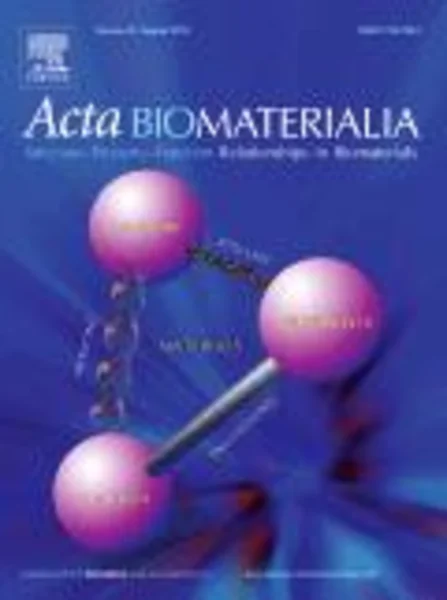-
chemistry-dependent adsorption of serum proteins onto polyanhydride microparticles differentially influences dendritic cell uptake and activation
جزئیات بیشتر مقاله- تاریخ ارائه: 1392/01/01
- تاریخ انتشار در تی پی بین: 1392/01/01
- تعداد بازدید: 632
- تعداد پرسش و پاسخ ها: 0
- شماره تماس دبیرخانه رویداد: -
the delivery of antigen-loaded microparticles to dendritic cells (dcs) may benefit from surface optimization of the microparticles themselves, thereby exploiting the material properties and introducing signals that mimic pathogens. following in vivo administration microparticle surface characteristics are likely to be significantly modified as proteins are quickly adsorbed onto their surface. in this work we describe the chemistry-dependent serum protein adsorption patterns on polyanhydride particles and the implications for their molecular interactions with dcs. the enhanced expression of mhc ii and cd40 on dcs after incubation with amphiphilic polyanhydride particles, and the increased secretion of il-6, tnf-α, and il-12p40 by hydrophobic polyanhydride particles exemplified the chemistry-dependent activation of dcs by sham-coated particles. the presence of proteins such as complement component 3 and igg further enhanced the adjuvant properties of these vaccine carriers by inducing dc maturation (i.e. increased cell surface molecule expression and cytokine secretion) in a chemistry-dependent manner. utilizing dcs derived from complement receptor 3-deficient mice (cr3−/− mice) identified a requirement for cr3 in the internalization of both sham- and serum-coated particles. these studies provide valuable insights into the rational design of targeted vaccine platforms aimed at inducing robust immune responses and improving vaccine efficacy.
مقالات جدیدترین رویدادها
-
استفاده از تحلیل اهمیت-عملکرد در ارائه الگوی مدیریت خلاقیت سازمانی و ارائه راهکار جهت بهبود
-
بررسی تاثیر ارزش وجوه نقد مازاد بر ساختار سرمایه شرکت های پذیرفته شده در بورس اوراق بهادار تهران
-
بررسی تأثیر سطح افشای ریسک بر قرارداد بدهی شرکت های پذیرفته شده در بورس اوراق بهادار تهران
-
بررسی تأثیر رتبه بندی اعتباری مبتنی بر مدل امتیاز بازار نوظهور بر نقد شوندگی سهام با تأکید بر خصوصی سازی شرکت ها
-
تأثیر آمیخته بازاریابی پوشاک ایرانی بر تصویر ذهنی مشتری پوشاک ایرانی (هاکوپیان)
-
مقایسه دو سیستم خطوط وسائل نقلیه با ظرفیت بالا h.o.v برگشت پذیر و هم جهت در بزرگراه ها- مطالعه موردی بزرگراه شهید همت تهران
-
بررسی اثر وجود و یا عدم وجود ساختار بر روی رفتار تراکم پذیری خاک های سیمانی شده مصنوعی با توجه به افزایش درصد متفاوت سیمان
-
نقش و جایگاه خلاقیت در طراحی فضاهای عمومی مورد مطالعه: بوستان آب و آتش
-
electrophoresis of a spherical particle in a spherical cavity
-
on the effect of turbulent intensity towards the accuracy of the zero-equation turbulence model for indoor airflow application
مقالات جدیدترین ژورنال ها
-
مدیریت و بررسی افسردگی دانش آموزان دختر مقطع متوسطه دوم در دروان کرونا در شهرستان دزفول
-
مدیریت و بررسی خرد سیاسی در اندیشه ی فردوسی در ادب ایران
-
واکاوی و مدیریت توصیفی قلمدان(جاکلیدی)ضریح در موزه آستان قدس رضوی
-
بررسی تاثیر خلاقیت، دانش و انگیزه کارکنان بر پیشنهادات نوآورانه کارکنان ( مورد مطالعه: هتل های 3 و 4 ستاره استان کرمان)
-
بررسی تاثیر کیفیت سیستم های اطلاعاتی بر تصمیم گیری موفق در شرکتهای تولیدی استان اصفهان (مورد مطالعه: مدیران شرکتهای تولیدی استان اصفهان)
-
امکان سنجی بلاک چین در برنامه ریزی و مدیریت پروژه
-
نقش شخصیت بزهکار و روش برخورد تربیتی درخور با شخصیت مجرم از دیدگاه آموزه های اسلام
-
فرازمندی دیوان سالاری در تمدن اسلامی و نقش دبیران ایرانی (با تاکید بر قرون نخست هجری)
-
بررسی تاثیر فرهنگ معنوی بر مسئولیت اجتماعی با نقش میانجی سرمایه اجتماعی کارکنان درمان بیمارستان های دولتی شهر تهران
-
نقش ادراک کارکنان از حمایت سازمانی در توسعه نوآوری سازمانی- مطالعه موردی: شعب بانک سپه استان فارس




سوال خود را در مورد این مقاله مطرح نمایید :